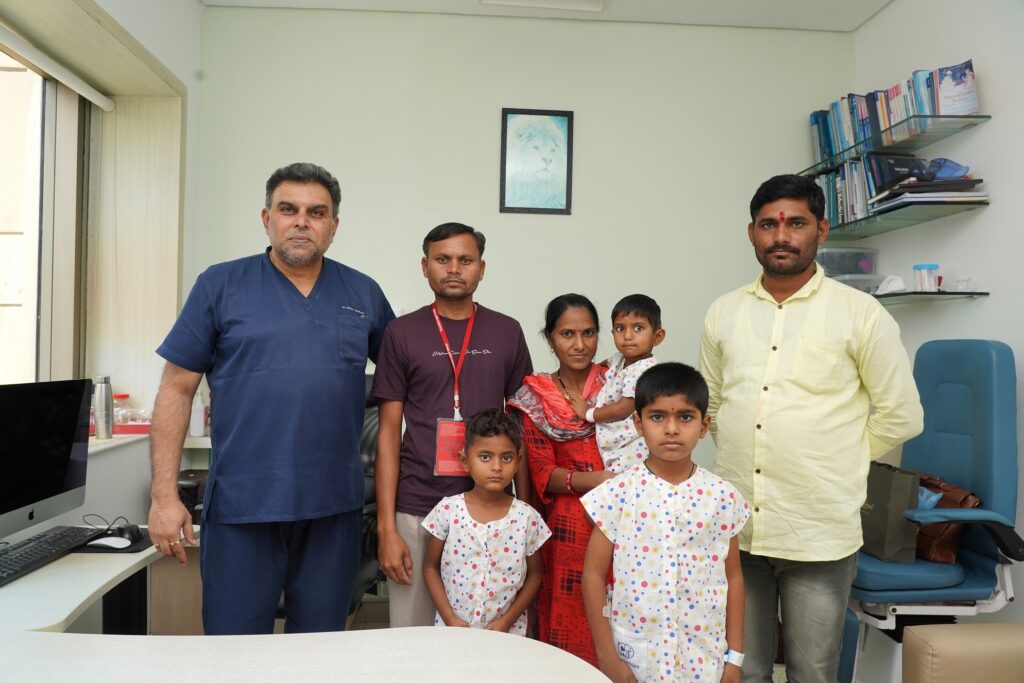Cochlear implant surgeries performed over the last one year to correct congenital deafness in 126 children
Mumbai, 27th April 2022 (GNI): The magic of sound, the gift of hearing is truly one of the best gifts that a child with deafness can receive. One of the five senses, hearing is critical for communication, psychosocial relationships and learning. Kokilaben Dhirubhai Ambani Hospital (KDAH) has brought the gift of sound to 126 children with congenital deafness over the last one year in collaboration with Rashtriya Bal Swasthya Karyakram (RBSK), the flagship program by the National Rural Health Mission (NRHM) and the Government of Maharashtra.
The program, implemented as a PPP model despite the challenges of COVID, has been a boon to children and their parents from the economically-backward section of society. Since the inception of the program in January 2021, KDAH has successfully performed surgeries on over 126 children. The parents of the children are happy that their children are finally going to school and as now they can hear, they will also talk.
The implants are funded by the State Government with KDAH responsible for scanning and imaging, surgery, speech therapy and accommodation for the patient and parents. KDAH also undertakes extensive aural rehabilitation for up to two years and also trains parents and caregivers for the same.
The patients are currently identified through screening at schools and anganwadis at the district level by a team of specialists and a civil surgeon appointed by the state. Before being selected for implant, a Brainstem Evoked Response Audiometry (BERA) is conducted to determine the child’s ability to hear and confirm profound hearing loss. Post confirmation, the child is given a hearing-aid for 3 months to check if they need an implant or not. If they do, they are referred to KDAH.
Speaking on the initiative, Dr Sanjiv Badhwar, Consultant and Head, ENT Services, Kokilaben Dhirubhai Ambani Hospital said, “It gives us immense joy to be a part of an initiative that gives an opportunity to profoundly hearing impaired children to hear again. Hearing impairment is a serious health concern among school-age children and can adversely impact their communication and education. With the support of the Rashtriya Bal Swasthya Karyakram scheme, we are able to initiate timely intervention for these children before it is too late. With the Cochlear Implant program, we are not only gifting them the joy of hearing, but also training them to speak, learn sounds, words and languages.”
Among the 126 children is Pragya, a 3-year-old girl from Gadchiroli. She was nine months of age when her parent noticed that while she was responding to hand gestures, she was not responding to sounds. A check-up confirmed that she had hearing impairment in both ears. They were advised to take the child to KDAH for treatment, but could not travel at that time due to Covid restrictions. Now, two years later, they got the child to KDAH where a cochlear implant in one ear is opening a new world of sound for Pragya.
Sameer is a 5-year-old boy from Gadchiroli, whose deafness was diagnosed at one year of age. The parents could not get him treated then as as there were no government schemes to support them monetarily at that time. Earlier under this scheme, the surgery was only limited to children up to 2 years old. It was in October 2020 that the eligible age was revised, allowing the family to come to KDAH after four years for the cochlear implant. Sameer can now hear!
After the surgery, the rehabilitation process takes a year. This includes sound mapping of the implanted machine with a progressive increase in the sound capability of the machine every month. This helps the child to get used to the sound vibrations, recognise voices and understand what’s being said slowly and steadily. As patients need a follow-up check every 2 to 3 months, KDAH arranges a check-up camp in the city that is near to their homes.
Dr Santosh Shetty Executive Director and CEO, Kokilaben Dhirubhai Ambani Hospital said, “It’s our honor to be a part of the healthcare initiative undertaken by the State Government for children from underprivileged families. India has the largest number of school-age children with hearing impairment. But the majority of them remain undetected and untreated due to the absence of a dedicated hearing screening program. Providing comprehensive treatment to patients in need is an integral part of our social initiatives and it is here that we are focusing on assisting the state government at every step, right from identifying the hearing disabled children to providing them with the best of world-class treatment. At KDAH we aim to not bind ourselves by geographies, and to reach out to those most in need to bring about a sustainable, positive change in their lives,” stated in the press release.
The Rashtriya Bal Swasthya Karyakram (RBSK) is a program by National Rural Health Mission (NRHM), a government initiative aimed at early identification and early intervention for children to cover 4 Ds, viz Defects at birth, Deficiencies, Diseases and Development Delays including disability. Ends GNI


Be the first to comment on "126 deaf children wake up to a new world of sound after Cochlear implant surgeries at Kokilaben Dhirubhai Ambani Hospital with support of Rashtriya Bal Swasthya Karyakram"